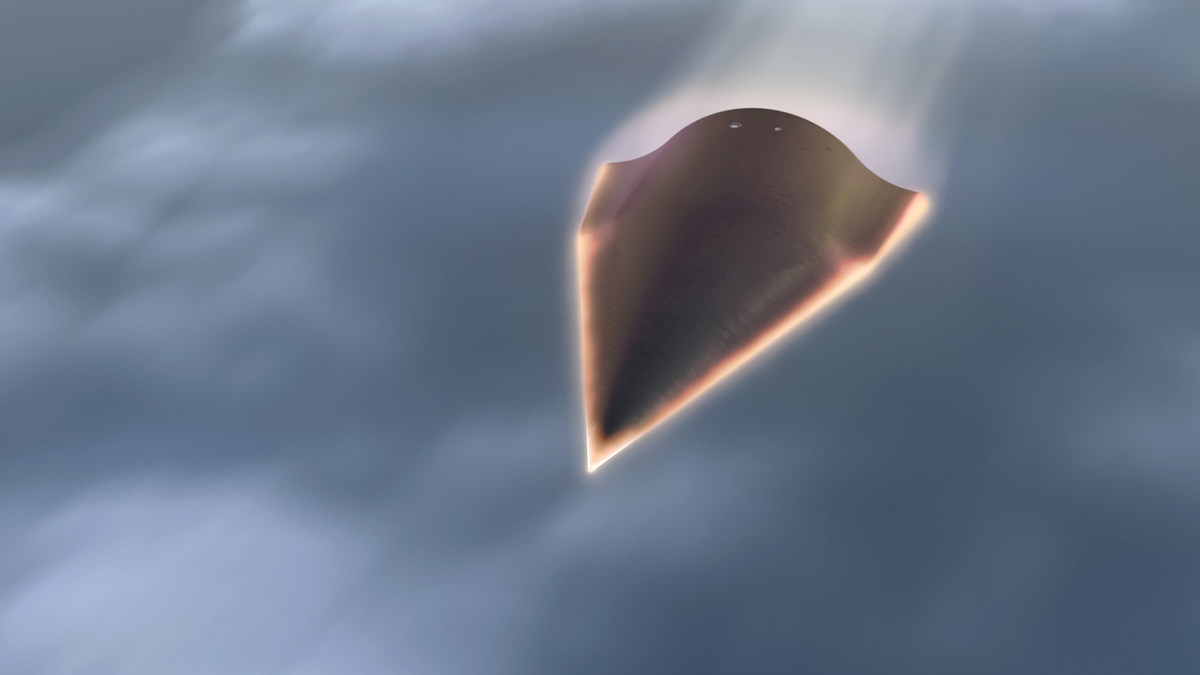
An artist’s illustration of the U.S. military’s experimental Hypersonic Technology Vehicle 2 (HTV-2) in flight. The Air Force recently awarded two contracts to Lockheed Martin for the development of two new superfast weapons systems, called the Hypersonic Conventional Strike Weapon (HCSW) and the Air-Launched Rapid Response Weapon (ARRW). (DARPA)
The arms race is picking up considerable speed, and the United States doesn't want to get left behind.
Over the past four months, the U.S. Air Force has awarded two contracts for hypersonic weapons worth a maximum of $1.4 billion to aerospace giant Lockheed Martin.
The first contract, announced in April, awards $928 million to develop something called the Hypersonic Conventional Strike Weapon (HCSW). And last week, the Air Force disclosed another deal, worth up to $480 million, to begin designing the Air-Launched Rapid Response Weapon (ARRW). [The Most Dangerous Space Weapons Ever]
"We are going to go fast and leverage the best technology available to get hypersonic capability to the war fighter as soon as possible," Secretary of the Air Force Heather Wilson said in a statement last week.
More From Space.com
Hypersonic vehicles travel at least five times faster than the speed of sound (Mach 5; Mach 1 at sea level is 762 mph, or 1,226 km/h). And they're designed to be maneuverable, which differentiates them from intercontinental ballistic missiles (ICBMs) and other fast-flying conventional weapons systems that follow predictable paths.
"We don't currently have effective defenses against hypersonic weapons because of the way they fly; i.e., they're maneuverable and fly at an altitude our current defense systems are not designed to operate at," Richard Speier, adjunct staff at the nonprofit RAND Corp., told CNBC in March. "Our whole defensive system is based on the assumption that you're gonna intercept a ballistic object."
Not much is known about either HCSW or ARRW. But hypersonic vehicles generally reach their tremendous speeds using supersonic combustion ramjet engines, or scramjets, whichs compress and combust air flowing in at supersonic speeds. Scramjet vehicles therefore need to hitch rides aboard, and launch from, fast motherships — typically missiles or jets.
HCSW and ARRW aren't the U.S. military's first forays into hypersonic technology. For example, the Defense Advanced Research Projects Agency (DARPA) has launched several test flights of an unmanned hypersonic bomber prototype called the HTV-2. During one of those trials, in August 2011, the vehicle reached Mach 20 before losing control.
DARPA and the Air Force worked together from 2004 through 2013 on the $300 million X-51A program, which developed and tested a robotic scramjet vehicle known as Waverider. Waverider technology could still find its way into a hypersonic weapon, military officials have said. And the U.S. Army has flight-tested its Advanced Hypersonic Weapon as well.
These various efforts could become more streamlined soon. On June 28, a joint team consisting of Pentagon top brass and officials with the Air Force, Navy, Army and Missile Defense Agency signed a memorandum of agreement to work together on the development of "hypersonic boost glide technology."
"The Joint Team requires the right mix of agile capabilities to compete, deter and win across the spectrum of competition and conflict," Air Force Chief of Staff Gen. David Goldfein said in the same statement. "We must push the boundaries of technology and own the high ground in this era of great-power competition and beyond."
There is indeed competition in the superfast-weapon realm. Russian officials have claimed that the country will be ready to field a jet-launched hypersonic vehicle by 2020 or so, and China tested its own hypersonic wave rider, known as Xingkong-2 ("Starry Sky-2"), earlier this month. The test was a success, according to Chinese media reports; Starry Sky-2 apparently flew at Mach 5 for more than 400 seconds and reached a top speed of Mach 6.
Originally published on Space.com.








































